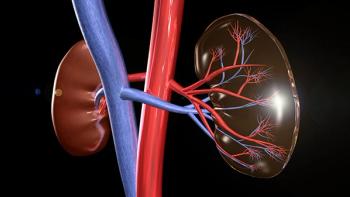
The FDA granted a priority review to entrectinib for the treatment of adult and pediatric patients with NTRK fusion-positive, locally advanced or metastatic solid tumors and for metastatic, ROS1-positive non-small cell lung cancer.

The FDA granted a priority review to entrectinib for the treatment of adult and pediatric patients with NTRK fusion-positive, locally advanced or metastatic solid tumors and for metastatic, ROS1-positive non-small cell lung cancer.

The FDA approved pembrolizumab (Keytruda) for the adjuvant treatment of patients with resected, high-risk stage III melanoma.

Event to Fund Cutting-Edge Pediatric Cancer Research

Hospital at Home oncology models can have benefits for patients and nurses – but widespread integration may not be straightforward.

Each Friday, Oncology Nursing News posts a question asking our audience to share their experiences and opinions about a range of topics in the world of cancer. Here are some of their answers.

A recent study compared the information-seeking methods of nurses, doctors, and complementary therapists, and found one underlying theme.

The FDA granted a priority review to pembrolizumab (Keytruda) in combination with axitinib (Inlyta) as a frontline treatment for advanced renal cell carcinoma.

An expert goes over the common – and not-so-common – immune-related adverse events.

Researchers are working on a way to spark the immune response against glioblastoma, making the nurses’ role in treatment even more important.

Oncology Nursing News® spoke with CEO Linda Tantawi about addressing the needs of underserved communities and nurses can help to educate women in the Greater New York City area.

The Food and Drug Administration (FDA) approved a split-dosing regimen for daratumumab (Darzalex) for the treatment of patients with multiple myeloma.

The FDA granted a priority review to avelumab (Bavencio) in combination with axitinib (Inlyta) to treat patients with advanced renal cell carcinoma (RCC).

The FDA granted a priority review to the supplemental biologics license application for pembrolizumab (Keytruda) for the first-line treatment of patients with recurrent or metastatic head and neck squamous cell carcinoma (HNSCC).

Adverse events can vary depending on the type of therapy that the patient is on, but patient communication is key.


During last night’s State of the Union Address, President Donald J. Trump announced his plan to bolster the fight against childhood cancer, and to bring down prescription drug prices.

In a presentation during the 16th Annual Winter Lung Conference™, Gregory J. Riely, MD, PhD, discussed the spectrum of activity of many of these FDA-approved EGFR TKIs.

A recent meta-analysis has found no noticeable difference in immunotherapy's efficacy based on patient sex.

CancerCare celebrated its 75th anniversary by revealing a new campaign "If It Matters To You, It Matters To Us."

Take a look back at the top 5 Oncology Nursing News stories for January 2019.

The FDA has expanded the indication for pemetrexed (Alimta) injection in combination with pembrolizumab (Keytruda) and platinum-based chemotherapy for the first-line treatment of patients with metastatic nonsquamous non–small cell lung cancer (NSCLC) without EGFR or ALK alterations.

Immunotherapy agents may soon combine with VEGF TKIs to redefine the frontline standard for treatment of metastatic renal cell carcinoma (mRCC).

$200,000 V Scholar Grant Awarded for Research Related to Blood Cancers

The phase III AIM2CERV trial investigating axalimogene filolisbac (AXAL) in patients with cervical cancer has been placed on partial clinical hold by the FDA.

The FDA recommends that no new patients with advanced soft tissue sarcoma be treated with the combination of olaratumab (Lartruvo) plus doxorubicin.

Neoadjuvant chemotherapy with dose-dense MVAC extends overall survival compared with other chemo regimens in bladder cancer treated with cystectomy.

In 2018, the V Foundation awarded $25 million for cutting-edge cancer research.

The FDA has approved the combination of ibrutinib (Imbruvica) and obinutuzumab (Gazyva) for the first-line treatment of patients with chronic lymphocytic leukemia (CLL) or small lymphocytic lymphoma (SLL).

Pembrolizumab (Keytruda) was found to reduce the risk of death by 31% in patients with PD-L1–positive (combined positive score [CPS] ≥10) advanced or metastatic esophageal or esophageal junction carcinoma who progressed on standard therapy, according to phase III findings of the KEYNOTE-181 trial.

Patients with previously untreated hepatocellular carcinoma (HCC) lived twice as long if they responded to TKI therapy vs. patients who did not achieve an objective response.